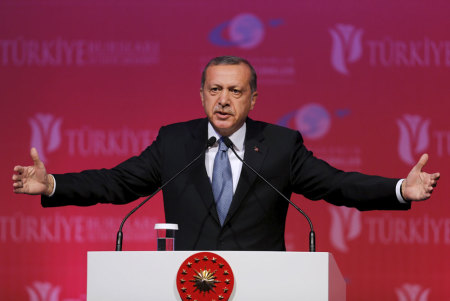Christians in Turkey's Parliament: The Kurdish Party Changes Turkish Political Landscape in Unprecedented Way

Incumbent Turkish President Tayyip Erdogan's Justice and Development Party (AKP) received 40.9 percent of the vote on Sunday, giving them the win, but not without setbacks.
The Republican People's Party (CHP) won 25 percent of the vote, the Nationalist Movement Party (MHP) 16 percent, and the pro-Kurdish Peoples' Democratic Party (HDP) with 13 percent.
AKP's win this year was its worst performance since it assumed political leadership in Turkey in November of 2002. With 86 percent turnout in the elections, the ruling party had only 258 seats in Turkey's new legislative body. This figure is down from the 327 seats it won during the previous elections in 2011, when the AKP received over half of the public vote.
Now the Islamists will only be able to form a government in coalition with one of the other victorious parties, since they failed to reach the benchmark of 276 seats – the necessary minimum for the continuation of the party's more than 10-year rule. Had HDP not passed the 10 percent barrier (the minimum figure that allows political parties to have seats in the Turkish parliament), the 550 seats of the legislative body would have been split among the top three winners, instead of four. That way Erdogan's AKP would have had enough MPs to form a new government without a coalition.
It is the first time in Turkish history that the Kurdish political party has critically reshuffled the country's political landscape in such a manner.
Presumably that was the reason why Erdogan's government intensified efforts to undermine the Kurdish party's rating during the run-up to the elections. Last week President Erdogan accused Armenians, journalists, the Alevi-Muslim minority members and homosexuals of helping HDP. "They [HDP] also received the support of some foreign media outlets, which see Turkey as their colony," he claimed.
Just a few days before making this statement, Erdogan said that it was CNN, The New York Times and BBC that were working to weaken and destroy the Turkish Republic.
In response to a question at the daily press briefing, Marie Harf, Senior Advisor for Strategic Communications at the Department of State, called Turkey to respect the freedom of press and decried Erdogan's attempts to blame Armenians, journalists and homosexuals.
According to Mehmet Yuksel, the Kurdish party's U.S. representative, "President Erdogan became more aggressive after he had realized AKP might not gain the absolute majority in elections." According to Yuksel's statistics, the U.S.-based Turkish citizens ranked the Kurdish party second during the early voting, which took place in May. "In America, the voters put the secular CHP and Kurdish HDP on the top, while Erdogan's AKP came only the third," Yuksel told The Christian Post.
However, the Kurdish party got not only get the Kurdish votes, but also the majority of votes from Turkey's other national minorities, as well as feminists and LGBTs. Last April, 750 feminists in Turkey called for support of the HDP, for which they initiated an online petition. The HDP will give half of its parliament seats to women: a historically unprecedented high quota in Turkish politics.
HDP is largely viewed as a more liberal and democratic party in Turkey. As a matter of fact, two Christian deputies, representing the Armenian and Assyrian communities have been elected to Turkey's new parliament from HDP's list last Sunday.
Two more Armenians were elected from the ruling party and secular opposition. This brings the total number of Christian parliamentarians in the 550 membered Turkish legislative body to four – the highest figure since the founding of the republic almost a century ago.
However, it would be safe to assume that it was the Kurdish party's initiative to bring Christians to the parliament that abetted the Turks to follow the same pattern. There had been no Armenian winners in any Turkish party for decades, prior to HDP's historic move. Dr. Taner Akcam, professor at Clark University, Massachusetts, thinks that the inclusion of Armenian candidates into the electoral lists had also to do with "growing civil society in Turkey."
"After Hrant Dink's (editor of Turkish-Armenian weekly, who was killed in Istanbul in 2007, C.P.) assassination Armenian Genocide and the problems of Armenian community as minority in Turkey became one of the central issues. And each party wants to get connected with this growing civil movement. One important reason is that this movement is very much related to the 'conscience of the society,'" Akcam mentioned in email communication.
The Kurdish party also supports Turkey's reconciliation with its past and speaks in favor of the recognition of the Armenian Genocide of 1915. The Turkish government and nationalists deny the historic fact of this century-old crime.
"We will call for opening of the Turkish-Armenian closed border and recognition of the Armenian Genocide. But, first, Turkey needs a government," Yuksel said.
Turkish PM Ahmet Davutoglu resigned this week and if no coalition forms by mid-July, new elections should take place.





















